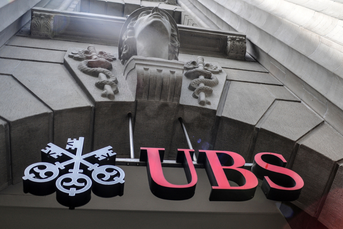Bankers, investors plan return to COP climate conference

This year's event in Dubai offers a chance for the industry to set out plans to finance green transition.
The world’s top bankers and investors mostly stayed away from last year’s United Nations climate conference in the Egyptian resort town of Sharm El-Sheikh. But holding December’s COP28 meeting in Dubai, one of the world’s major financial centers, pretty much guarantees they’ll make a much bigger showing.
Banks including Barclays Plc, Citigroup Inc. and Standard Chartered Plc are preparing to send larger delegations this year, in part because they have offices in Dubai. Bill Winters, who runs Standard Chartered, will attend after skipping the Egypt gathering.
Barclays Chief Executive C.S. Venkatakrishnan is planning to be at COP28 after staying away in 2022. His team will host client events on increasing the flow of money to climate technologies and developing carbon-saving projects.
“How to scale the deployment of renewables in emerging economies, which are the fastest-growing sources of emissions, will be a central question,” says Daniel Hanna, Barclays’ global head of sustainable finance for its corporate and investment bank.
The UK bank expects that talk about climate finance will find a receptive audience in the Middle East, where sustainable finance activity has been increasing. Saudi Arabia’s sovereign wealth fund raised $5.5 billion from a green bond sale in February, which Barclays wasn’t involved in. Hanna says the bank also is exploring a number of potential debt-for-nature swap transactions, financial instruments that give countries access to debt relief in exchange for promises to protect their environments.
The return of bankers will create a big opportunity to talk up their efforts to help finance a quicker transition to green energy, one of the host nation’s key objectives, and earn some goodwill from a public increasingly skeptical of lofty promises that green bonds and sustainable investing can truly help the planet. BloombergNEF estimates that banks need to channel four times as much capital into renewable energy as they do into fossil fuels by the end of the decade for the world to have a chance of achieving net-zero emissions by midcentury. Their latest estimate suggests that ratio is currently closer to 1:1.
The last time big bank CEOs came out in force to a COP was in 2021, when the unveiling of the Glasgow Financial Alliance for Net Zero, a collection of many of the world’s biggest lenders and asset managers committed to achieving net zero financed emissions by 2050, was one of the headline achievements. GFANZ, which counts JPMorgan Chase & Co. and BlackRock Inc. among its 650 members, is supposed to represent a “wall of capital” to finance green solutions.
Since then, an energy crisis that elevated fossil fuels has tempered enthusiasm among some finance companies about phasing out the funding of oil, gas and coal too aggressively. A backlash against ESG investing, which takes into account environmental, social and governance factors, from the US right has hamstrung some investors and contributed to a mass exodus of insurers from a GFANZ subgroup focused on cutting emissions from insurance underwriting portfolios.
Although the finance industry is likely to tout new instruments meant to channel funds into the green transition at COP28, the question will be how much money it’s truly committing, says Irena Spazzapan, a former Goldman Sachs Group Inc. commodities banker who now runs Systemiq Capital, a climate-focused venture capital fund.
The United Arab Emirates “sees the COP less as a climate conference and more as a diplomatic platform. And it would be a diplomatic victory for them if they can announce some big investments in infrastructure in the Global South,” Spazzapan says. “No one is building renewables in the emerging economies, and they will want to be seen as the nation that made that happen.”
A GFANZ spokesperson said in an email that the group is seeking progress on three fronts at COP28: stronger government policies, reforms at multilateral development banks to encourage private climate investment in emerging markets, and more action to cut emissions from challenging sectors such as steel and cement. (The group is co-chaired by Mark Carney, who’s been named chairman of Bloomberg LP’s board and is a former Bank of England governor, and Michael R. Bloomberg, the founder of Bloomberg News parent Bloomberg LP.)
Dubai is a natural meeting place for the world’s monied elite, but it’s an awkward location for a climate conference. Not only will COP28 take place in the world’s most oil-rich region, but the head of the state-backed Abu Dhabi National Oil Co., Sultan Al Jaber, will preside over the event. Al Jaber has faced fierce criticism from the moment of his appointment by those worried he’ll allow the summit to be co-opted by elements wishing to prolong the fossil fuel era. For his part, Al Jaber has repeatedly said that “the phase-down of fossil fuels is inevitable” and called for tripling the deployment of renewable energy worldwide.
A COP28 spokesperson said in an email that organizers are “working with the Group of 20 High-Level Expert group on a joint declaration by political and business leaders on a set of principles for and commitments to accelerate a new finance framework.” They are also collaborating with GFANZ, the International Monetary Fund and the World Bank to “unlock the power of the capital markets and incentivize capital and finance at multiple levels.”
But lenders are under pressure to do more than talk in Dubai. A landmark UN assessment of global progress on cutting emissions released in September showed countries are largely failing to meet their commitments under the Paris Agreement, putting the planet on course for catastrophic global warming.
“There is plenty of money in the world, especially in Dubai, yet finding patient capital to fund carbon reductions is challenging,” says Rebecca Self, a former senior green finance banker at HSBC Holdings Plc who now runs Seawolf Sustainability Consulting. “It is time for the financial organizations at COP to put their money where their mouth is.”
At last year’s climate summit, one persistent topic of discussion on the official Finance Day was how international lenders such as the World Bank can reduce the risk for private companies in financing clean energy investments in developing economies. The issue was the key agenda item earlier this year at conferences that gathered world leaders in Paris and Nairobi, Kenya.
Now it’s time to move to action, says Harald Walkate, former head of ESG investing at Natixis Investment Managers who’s now a senior fellow at the University of Zurich’s Center for Sustainable Finance and Private Wealth.
“We’ve all done plenty of observing that we need to boost private finance flowing into climate-related projects by using blended finance, but now we actually need to do it,” he says. “It’s in the Global South where the heavy lifting is needed, and it’s there that will determine whether or not we meet the Paris goals.”
Learn more about reprints and licensing for this article.








